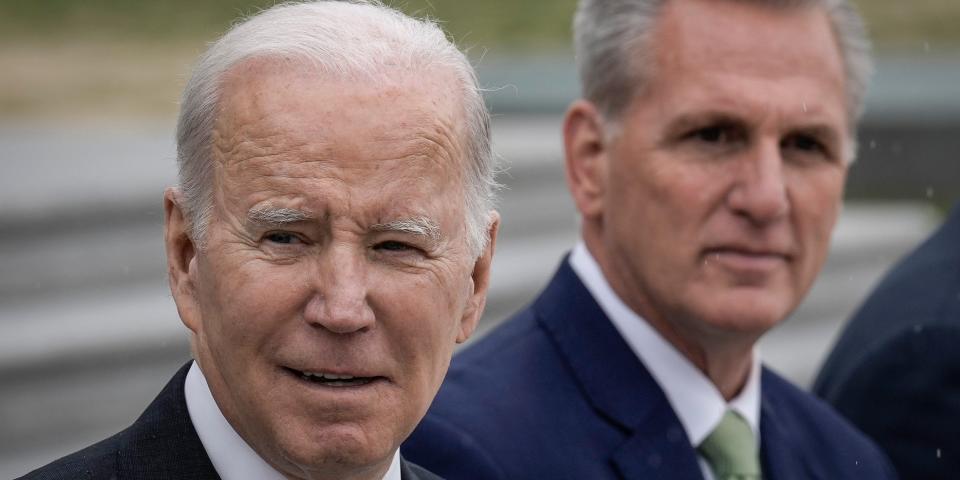US stocks slide as traders wait for lawmakers to vote on debt ceiling deal

Stocks slid on Wednesday ahead of a House vote to resolve the debt-ceiling crisis.
The price of credit default swaps linked to US debt show investors think a default is possible, though unlikely.
All three major indexes ended the day in the red, with the Dow sliding more than 100 points.
US stocks slid on Wednesday as investors waited for lawmakers to vote on a potential resolution to the debt-ceiling crisis. All three major indexes ended the day in the red, with the Dow Jones Industrial Average sliding over 100 points.
The deal, negotiated by President Joe Biden and House Speaker Kevin McCarthy over the weekend, passed the House Rules Committee with a 7-6 vote on Tuesday night, with a full House vote scheduled for Wednesday evening.
Markets have lowered their expectations of a US debt default, though the price of credit default swaps tied to US debt still show that investors think a default is possible. The one-year implied probability of a default fell to 1.3% on Tuesday at the market close, down from a peak of 4.3% on May 11, per MSCI research.
Here's where US indexes stood at the 4:00 p.m. ET close on Wednesday:
S&P 500: 4,180.13, down 0.6%
Dow Jones Industrial Average: 32,910.90, down 0.4% (131.88 points)
Nasdaq Composite: 12,935.29, down 0.63%
Investors were also discouraged by slowing factory activity in China, as well as unexpectedly strong preliminary jobs data in the US. Job openings rose above 10.1 million, surpassing economists' predictions of 9.4 million openings.
Meanwhile, Fed Governor Philip Jefferson suggested more interest rate hikes could be in order, adding in a press conference on Wednesday that a potential pause in rates would not mean interest rates had yet peaked.
Philadelphia Fed President Patrick Harker said he believed the central bank should "skip, not pause" rates at its next policy meeting, contingent on the official May jobs report and inflation data.
Here's what else is going on:
Real estate investors are retreating from the housing market at record pace, according to Redfin data.
Nvidia could climb another 26% as its supercomputer launch will solidify the company as a leader in the AI space, Bank of America forecasted.
Elon Musk told officials in Beijing he's opposed to China and the US breaking down their economic ties.
Mega-cap tech dominance in the S&P 500 is obscuring investor bets that the economy may already be in a recession.
Americans shouldn't delude themselves into thinking that China won't continue to outgrow the US economy, a former Treasury official said.
Billionaire investor Mark Mobius says he's finally been able to get his money out of China - but investments in the country still pose a "dilemma."
In commodities, bonds, and crypto:
Oil prices dipped, with West Texas Intermediate down 2.2% to $67.92 a barrel. Brent crude, the international benchmark, slipped 1.1% to $72.71 a barrel
Gold edged 0.2% higher to $1,982.30 per ounce.
The 10-year Treasury yield ticked down five basis points to 3.63%.
Bitcoin declined 2.8% to $27,027.98.
Read the original article on Business Insider

 Yahoo Finance
Yahoo Finance 